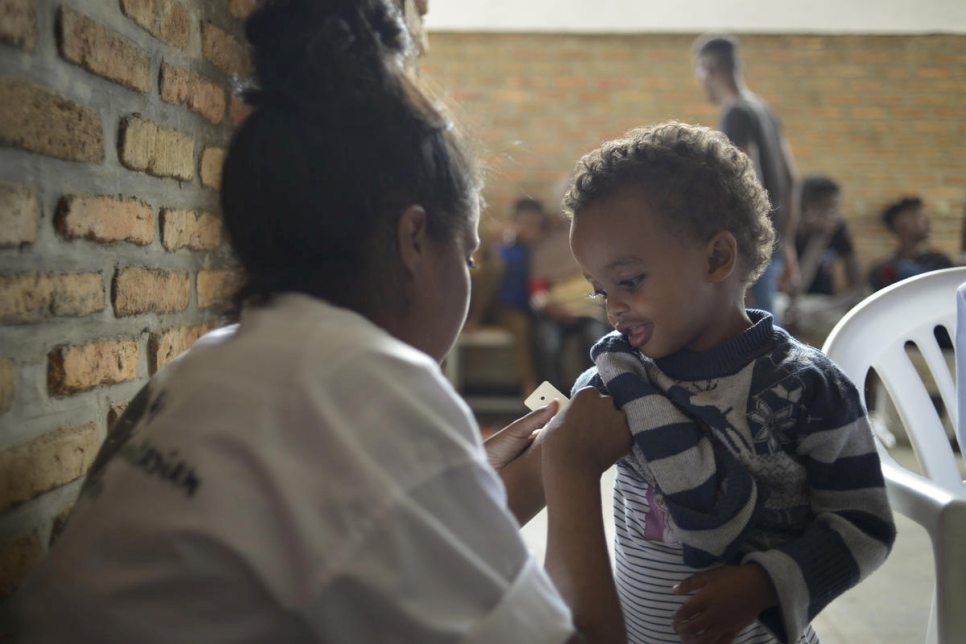Second life-saving evacuation of vulnerable refugees from Libya lands in Rwanda
This is a summary of what was said by UNHCR spokesperson Andrej Mahecic – to whom quoted text may be attributed – at today's press briefing at the Palais des Nations in Geneva.

A young child has his arm measured during his medical screening at the Gashora Emergency Transit Centre in Rwanda. © UNHCR/Tobin Jones
At around 11:20pm last night, a group of some 123 vulnerable refugees arrived at Kigali International Airport, the second evacuation flight to Rwanda from Libya. They have been taken to a transit facility in Gashora, where UNHCR, the UN Refugee Agency, is providing them with life-saving assistance, including food, water, medical care, psycho-social support, and accommodation.
They have been given asylum-seeker status while their cases are assessed and further solutions are pursued, including resettlement, voluntary return to countries of previous asylum, voluntary return to countries of origin where safe to do so and integration with local Rwandan communities.
The group was comprised mainly of Eritreans, as well as smaller numbers from Somalia, Ethiopia, and Sudan.
Around half of the group (59), were under 18 years old, the vast majority of whom had been separated from their parents and wider family. One of the children had previously been held in detention for more than two and half years. The youngest evacuee is just eight months old.
Most of the group were evacuated via the Gathering and Departure Facility after UNHCR had previously secured their release from detention. Others were evacuated directly from detention centres, while two had been living in urban areas. Amongst the evacuees included survivors of the 2 July airstrike on Tajoura detention centre.
Individuals were identified based on assessments of vulnerability. The number of available evacuation and resettlement places is not enough to meet the needs, so efforts are made to prioritise those most in need, often including unaccompanied children, survivors of torture and other abuses, people in need of medical treatment, amongst others.
UNHCR is grateful to the support received from Rwanda and Niger, and the African Union, through the Emergency Transit Mechanism in the two countries, as well as other States who have helped us move vulnerable refugees out of harm’s way in Libya.
Following this evacuation, UNHCR has assisted 1,663 vulnerable refugees out of Libya in 2019. However, increased places and faster, more flexible processes are needed to move more refugees away from danger.
However, it is clear that the number of available resettlement and evacuation places will continue to be outstripped by the needs. For those we are unable to move out of Libya, alternatives to detention must be found, and UNHCR reiterates our call for all detention centres to be closed and the detainees released.
Some 3,740 refugees continue to be held in detention centres, including people newly-detained after being recently rescued or intercepted at sea by the Libyan Coast Guard. Together with other vulnerable refugees living in urban areas, they remain at risk of being caught up in the continued clashes, or being subjected to horrific forms of harm in the hands of smugglers and traffickers in Libya.
For more information on this topic, please contact:
In Nairobi (regional), Dana Hughes, [email protected], +254 733 440 536
In Tripoli, Tarik Argaz, [email protected], +216 29 9612 95
In Geneva, Charlie Yaxley, [email protected], +41 79 580 8702
In Geneva, Babar Baloch, [email protected], +41 79 513 9549
